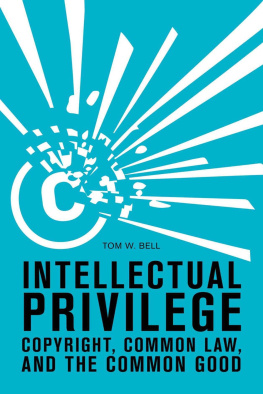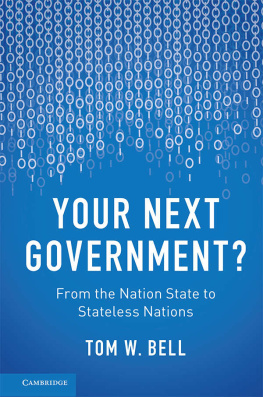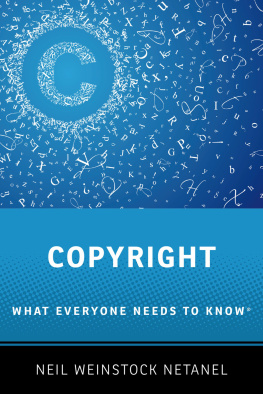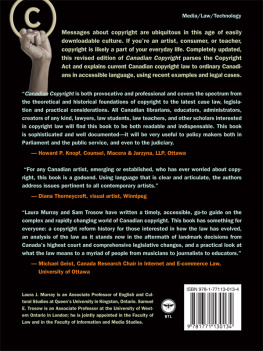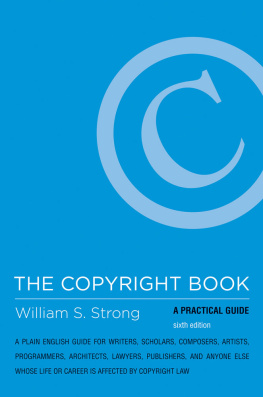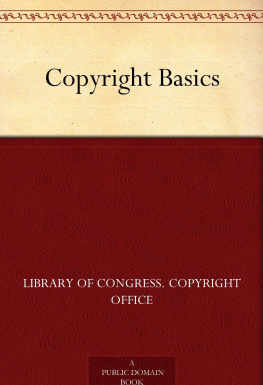Founders 2014 by Tom W. Bell (see opposite for more information)
Bell, Tom W.
Intellectual privilege : copyright, common law, and the common good / Tom W. Bell.
1. Copyright--United States. I. Title.
COPYRIGHT NOTE
Not long ago, in Five Reforms for Copyright ( of Copyright Unbalanced: From Incentive to Excess , published by the Mercatus Center at George Mason University in 2012), I suggested that the United States should return to the kind of copyright the Founders supported: the one they created in their 1790 Copyright Act. The Founders copyright had a term of only fourteen years with the option to renew for another fourteen. It conditioned copyright on the satisfaction of strict statutory formalities and covered only maps, charts, and books. The Founders copyright protected only against unauthorized reproductions and offered only two remediesstatutory damages and the destruction of infringing works.
This book follows through on that policy advice. The Mercatus Center and I agreed to publish it under terms chosen to recreate the legal effect of the Founders 1790 Copyright Act. For example, the books copyright will expire in 2042 (if not before), and you should feel free to make a movie or other derivative work at any time. How do we plan to achieve this effect? The books publication contract includes the following provisions, under the heading Copyright:
- That the copyright term, rights, and remedies (Privileges) in the Book will extend only so far as would have been allowed by the U.S. Copyright Act of 1790, as of its enactment. With regard to all other copyright Privileges, [the Mercatus Center and Tom W. Bell] make a Creative Commons CC0 1.0 Public Domain Dedication, waiving all copyright and related or neighboring Privileges with respect to the Book to the fullest possible extent.
- The Mercatus Center will make good faith efforts to comply with the formalities of the 1790 Copyright Act or, if current government policies make that impossible, to approximate the effect of those formalities through other means.
- Prof. Bell and the Mercatus Center intend third parties to rely on this Agreement to limit the copyright Privileges in the Book. To encourage that reliance, Publisher will include in the Book prominent notice of these copyright terms.
Founders Copyright 2014 by Tom W. Bell.
I dedicate this book to my mother, Helen Cunningham, a now-retired librarian whose love of learning I have been privileged and quite right to copy. (You get the next one, Dad!)
CONTENTS
INTRODUCTION
COPYRIGHT ON THE THIRD HAND
T wo views dominate the debate over copyright policy. The view from the left tends to question all restraints on expression, whether they arise from censorship, copyright, or the common law, and regards property rights as far from sacrosanct. From the right, in contrast, copyright looks like any other sort of property, which as such demands the same respect afforded to tangible property like land, buildings, and tools. Each viewpoint reveals important truths: copyright impinges on freedoms of expression, even while its exclusive rights stimulate the creation of new works. Both viewpoints, however, fail to perceive copyrights most distinguishing feature: its origin as a statutory privilege distinctly different from, and less justified than, the rights Americans enjoy thanks to the common law.
These pages build on that insight to offer a third view of copyright, one that does not quite fit the traditional left-right divide. You might think of it as a (not the ) libertarian view, given that reasonable libertarians will disagree with many of this books finer points and some of its major ones. Regardless of how you label this approach, though, it offers fresh answers to unresolved questions about the best way forward for copyright law and policy.
1. LEFT, RIGHT, AND FORWARD
Like most commentators, I largely agree that copyright represents not so much a form of property as a mere tool of policy, one designed to promote the Progress of Science and useful Arts, as the Constitution puts it.
As a creature of statute, copyright represents a notable exception to our natural and common-law rights. My friends on the left too often fail to make that distinction, instead classifying copyright as one of the many manifestations of state power that parade under the name of property and that they would subordinate to freedom of expression, security from want, distributional fairness, popular will, or other values. I instead hold that the common law, because it largely instantiates our natural rights, merits special regard. Hence my complaint against copyright: it violates the natural and common-law rights that we would otherwise enjoy to freely use our voices, pens, and presses. Hence also the argument I make to my friends on the right: copyright does not merit as much respect as tangible forms of property; as a statutory privilege to violate other, more fundamental rights, copyright instead merits critical scrutiny.
That critique of copyright hardly renders it unjustified per se. We can in theory excuse apparent violations of natural and common-law rights, such as the takings effectuated by taxation or the restraints imposed by antitrust law, as the costs of obtaining a greater good. So we might in theory justify copyright, too. But even then copyright would rank as a necessary evil at best. And even then, its status would rely on the contingencies of fact. If, for instance, as argued below, technological and social developments tend to render copyright unnecessary, it will someday rank as simply an evil. Perhaps, in some areas and in some respects, that day has already come. Regardless, we all have an interest in ensuring that copyright stays within its proper bounds. I thus offer here not an attack on copyright, but rather an appreciation of its noble goals, a frank account of its recent excesses, and some friendly advice about how to once more put copyright in the service of the general welfare.
2. ON ONE MORE HAND
On the one hand, we can disparage both copyright and common-law mechanisms for protecting expressive works. On the other hand, we can exalt copyright as a form of property more powerful than any conflicting common-law right. If we limit ourselves to those two hands, however, we embrace a false dichotomy. Conceptually, at least, we can best grasp copyright policy on the third hand, recognizing that it cries out for justification because it violates common-law rights, and justifying itif we canonly as a necessary and proper mechanism for promoting the public good.
This third view suggests a great deal about both how current copyright policies malfunction and how to fix them. The insights of this distinctly libertarian view of copyright include:
- A picture of copyrights relation to other forms of intellectual privilege/property;
- A birds-eye view of the common law;
- An economic model for maximizing copyrights social benefits;
- A history of the non-natural, statutory origins of copyright;
- Reasons for respecting others copyrights;
- An understanding of copyright as a type of statutory privilege, not property;
- The indelicate imbalancing of copyright policy;

